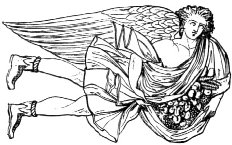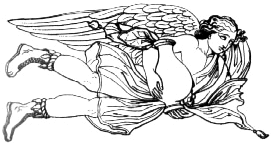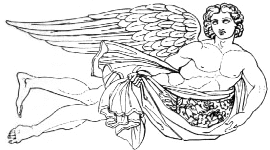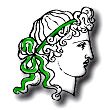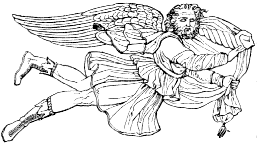
BOREAS - NORTH WIND
Boreas was the Greek god of the North
Wind who lived in a fertile region of Greece called Thrace. He is at
home beside the river Strymon, but also inhabits a cave on Mount
Haemus, a favorite haunt of the monster Typhon.
Sometimes said to have serpent-tails
for feet, Boreas blew from the north, whistling through his conch. He
often is depicted as being amber-winged,
extremely strong, sporting a beard, and normally clad in a short
pleated tunic.
Boreas is the son of Eos (Dawn) and the Titan Astraeus
(some say that Aeolus is his father), and the
brother of Zephyrus, Eurus and Notus (some mythographers also make him
brother to Hesperus). Unlike the gentle Zephyrus,
however, the violent and stormy North Wind was capable of terrific destruction.
Gods often appealed to him to torment mortals, such as the time Hera
asked him to shipwreck the hero Heracles (Hercules) on the island of
Cos. Still, he
often helped sailors by providing them with a friendly breeze.
Boreas once disguised himself as a
dark-maned stallion and mingled with twelve of the 3,000 mares grazing
beside the river Scamander. These famous horses belonged to
Erichthonius, and from the union were born twelve fillies. They were
so fleet that they could race over ripe ears of field corn without
bending them, or over the crests of waves.

BOREAS AND OREITHYIA
By Evelyn DeMorgan
Boreas is notorious for kidnapping
Oreithyia, who was the daughter of Erechtheus and Praxithea, king and
queen of Athens. The wind god had long loved the young girl and had
repeatedly asked her parents for her hand in marriage. However, they
kept putting him off, telling him to wait, and using delaying tactics on
Boreas.
The North Wind began to lose patience and
decided to abandon his modest wooing: One day, Boreas saw Oreithyia playing
beside the river Ilissus. Taking advantage, he swooped down unseen by
anyone, tucked her beneath his amber wings, and carried her off to a
rock near the river Ergines. Wrapped in a mantle of dark clouds, he then
proceeded to ravish the helpless maiden.
Oreithyia became his wife and they
settled down at the city of Thracian Cicones. They had twin sons,
called Calais and Zetes (the Boreades), who were born normal but grew
golden wings on their shoulders upon reaching adulthood. These swift
men took part in the famous Quest for the Golden Fleece, accompanying
Jason as part of the Argonauts, but were later killed by the great
hero Heracles (Hercules). Boreas and Oreithyia also had two daughters,
named Cleopatra and Chione.
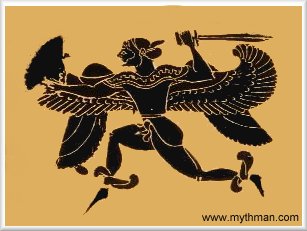
A BOREAD (son of
Boreas)
image from ancient Greek vase
Because of his union with Oreithyia,
the Athenians regard Boreas as their brother-in-law or son-in-law, and once
beseeched him to destroy the fleet of King Xerxes of Persia, which
threatened the city of Athens. That was during the battle of
Artemisium, fought in 480 BC.
The North Wind devastated the enemy
fleet by invoking a violent storm, sinking 400 ships, and sending
countless men and incredible treasure to a watery grave. The grateful citizens built
Boreas a splendid temple sanctuary on the banks of the river Ilissus
and a great
festival, called the Boreasmi, was held annually in his honor to
commemorate the Persian defeat.
The Romans identified Boreas as Aquilo. His name means "North Wind" or
"Devouring".
|
